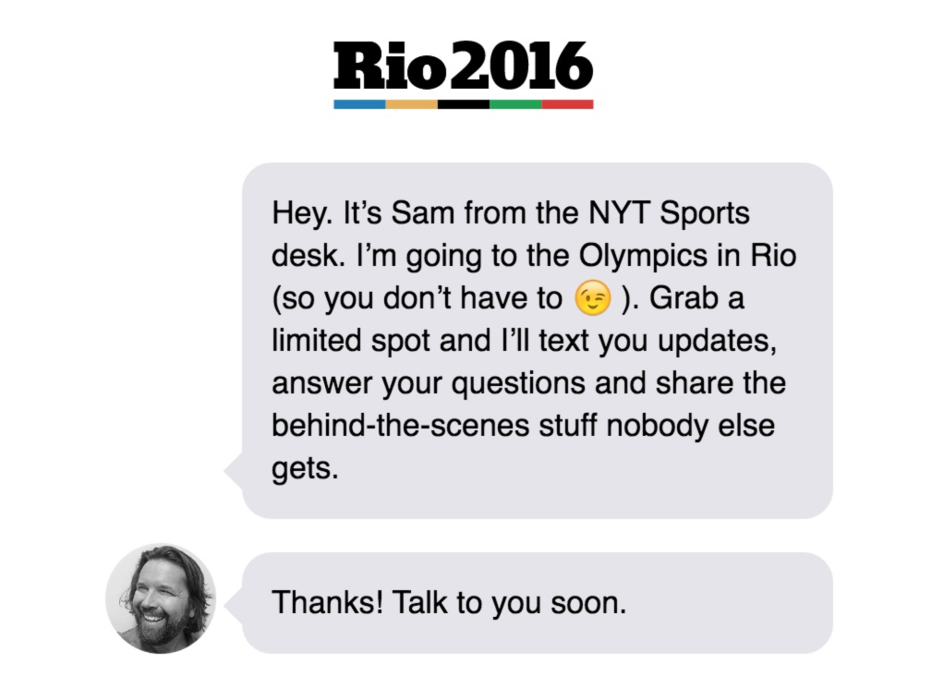Keith O’Brien, Editorial Director
Those interested in the Olympics for the actual competition and not the public health notices can sign up to receive text dispatches from a New York Times sports editor. SMS continues to be an underutilized service for brands and publishers alike. When both are worried about the impact and power social networks hold over their consumers, they cherish their email lists, but what about their customers’ and readers’ cell numbers?
As Shine cofounder (and 40 Under 40 nominee) Naomi Hirabayashi told us recently, think about “how effective text messaging can be at scale with it’s 98% open rate and it’s hyper-personal nature.”
Kim Davis, Senior Editor
Everyone’s talking about the rise of the chatbots. I had a real-life experience with Microsoft Outlook today. I asked to chat and was told I was number 51 in line. Half an hour later I was number 35. At time of writing I’m number 16, and I’m giving up. There is nothing the human chat assistant could now do to provide good customer service. That window was a couple of hours ago.
Could a virtual assistant do better? Sure, even a mediocre virtual assistant could at least show up and say “Hi.”
Perry Simpson, Web Editor
The recent success of comic book movies (CBMs) can be largely attributed to producers’ deep understanding of the CBM audience, and what’s important to their movie-going experience. That’s why it’s so frustrating to see Warner Brothers’ leadership struggle to grasp what fans of its DC Comics properties really want.
While I usually like to call attention to the marketing and strategy behind CBMs, I can only do so when the product (the film) actually delivers a positive experience for its audience (customers). This doesn’t appear to be the case with Warner Brothers latest superhero romp Suicide Squad. In fact, Suicide Squad appears to be an example of a disconnect between top-level producers and Warner executives, and fans of DC Comics and CBMs.
Whether it’s the talent behind the film’s production, superhero fatigue among moviegoers, or anything else, the bad reception of Suicide Squad could’ve been avoided by simply understanding the CBM audience.
We asked earlier this week Why Marvel Introduced a Loyalty Program to Fans Who’ve Been Loyal For Years, and found our answer in the reams of omnichannel data available on people who live and breath comic books and CBMs. Perhaps the better question would have been why more entertainment brands (like Warner Brothers) haven’t followed suit. Clearly, not understanding your customer (and producing content for them anyway) is suicidal.
Elyse Dupre, Special Features Editor
Virtual reality (VR) is a hot topic in the marketing world, and one area where it has the potential to make a significant impact is sports.
Consider the 2016 Olympics in Rio, for instance. Time reported that NBC Olympics is providing VR coverage of the Games to viewers who have Samsung Galaxy smartphones with Samsung Gear VR through its NBC Sports app. According to the article, the app will grant users 360-degree views of the Opening and Closing Ceremonies, as well as key sporting events—including men’s basketball, gymnastics, track and field, beach volleyball, and more. People will also get to view highlight packages from this perspective.
Virtual reality offers pluses and minuses for sports. On the one hand, it allows remote fans to better engage with the game and its athletes, which could deepen their loyalty. On the other hand, one has to wonder if it could deter people from buying tickets to actual events altogether. It looks like marketers will just have to play ball to find out.






